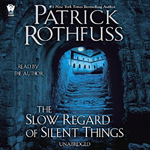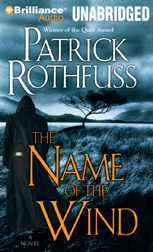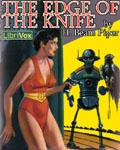
 The Slow Regard of Silent Things (Kingkiller Chronicle Book 2.5)
The Slow Regard of Silent Things (Kingkiller Chronicle Book 2.5)
By Patrick Rothfuss; Narrated by Patrick Rothfuss
Publisher: Penguin Group USA
Publication Date: 28 October 2014
[UNABRIDGED] – 3 hours, 39 minutes
Themes: / Kingkiller / fantasy / university /
Publisher summary:
Deep below the University, there is a dark place. Few people know of it: a broken web of ancient passageways and abandoned rooms. A young woman lives there, tucked among the sprawling tunnels of the Underthing, snug in the heart of this forgotten place. Her name is Auri, and she is full of mysteries. The Slow Regard of Silent Things is a brief, bittersweet glimpse of Auri’s life, a small adventure all her own. At once joyous and haunting, this story offers a chance to see the world through Auri’s eyes. And it gives the reader a chance to learn things that only Auri knows…. In this book, Patrick Rothfuss brings us into the world of one of The Kingkiller Chronicle’s most enigmatic characters. Full of secrets and mysteries, The Slow Regard of Silent Things is the story of a broken girl trying to live in a broken world.
Executive Summary: I think this is a book that most of the hard core fans will gush over, but I thought it was just alright. 3.5 stars rounded down for reasons I get into (rant about?) below.
Audio book: I haven’t done any of the Kingkiller books in audio. I have friends who have gushed to me over both the Rupert Degas and the Nick Podehl versions.
I’m not sure if those people will bothered by this one being read by Mr. Rothfuss himself, but I thought for this book at least, he makes for a good narrator. As he was the one who wrote it, he was able to put emphasis on the words he wanted to and he has a good story telling voice.
Full Review
I’m going to try to write a review without getting too ranty, but I may fall short in that regard, so I apologize in advance.
First a little background as to where I’m coming from: I heard about The Name of the Wind and Patrick Rothfuss over four years ago from Penny-Arcade. Since that time I had several friends telling me I had to read it.
I was reluctant to do though, because the third book hasn’t been published and there is no real eta in sight. I was content to wait until at least their was an announced publish date. Until last year that is, when I finally caved and read both books with a few friends. I’m glad I finally did, though now I’m stuck waiting for the final book like everyone else.
I seem to be in a minority of the fans I’ve talked to who thought that The Name of the Wind was good, but The Wise Man’s Fear was much better. So maybe that will put me in the minority of fans once again who find myself a bit disappointed with this story.
Originally slated for Rogues, Mr. Rothfuss set this one aside and wrote The Lightning Tree instead. It has a similar feel to this. We follow Bast around for a day in the life. I really loved that story. I felt like we got some good insights to his character we didn’t in the main novels.
Auri is definitely one of my favorite characters in his books, so I was really excited to see he had a novella about her coming out. Until I saw the price. I like to support authors I read so they will hopefully continue to write more stories I enjoy, but $17 for a 150 page novella seems crazy to me. So maybe I was already in a negative mindset coming into this book.
I was planning to wait until I could get a copy from the library and if I enjoyed it, picking up a copy for my shelves if/when the price came down. However, I was fortunate enough to receive an early review copy of the audio book, making the price irrelevant to me personally.
So I’ve written all these words now (and apparently you’ve kept reading them) and still really haven’t talked about the book. That seems appropriate because there really isn’t a story here.
We follow Auri around for a week. We do get some insights into her thought process. Maybe someone smarter than me will argue we get a lot of insights. Maybe if I read it again, I’ll come away with more. I don’t know. What I really wanted was to know more about Auri’s background more so than her character. As far as I’m concerned, you get none of that here. Maybe I’m just not smart enough.
And that brings me to why I rounded down my rating of 3.5 to a 3. I was all set to round up to 4 because I really like Patrick Rothfuss, and I really like Auri. He seems like a generally nice guy who does a lot of great things for other people with his success and influence.
But Mr. Rothfuss felt the need to include this long author’s note at the end. He makes it out like an apology to his fans who may not “get” this book, or don’t like it. But to me it came off as insincere and really more like him turning up his nose at anyone who doesn’t love this story as much as Vi Hart.
And the thing is, I didn’t dislike it for any of the reasons he mentioned. This book definitely FEELS like Auri. I liked all the randomness. Auri’s OCD makes me feel way better about my own. She really is a great character, and that shines through here. As I said my main disappointment was getting nothing about Auri’s back story.
But to talk about “There are plenty of stories out there for you, even if this one isn’t” came off condescending to me. I’m probably just reading it the wrong way, because Mr. Rothfuss never stuck me as that sort of person before now.
So if you want a story where nothing really of note happens and to just spend time with Auri, you’ll probably love this story. If you like me were hoping for some kind of back story, you may be disappointed like I was. There definitely were a few hints dropped, but nothing that made any real sense to me, just left me with more questions than before I read it.
Review by Rob Zak.



